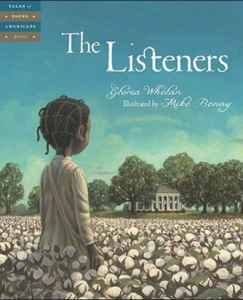Another Literary Analysis by Maya
Citation: Whelan, Gloria. The Listeners. Chelsea, MI: Sleeping Bear Press, 2009.
Reliability: I could tell that this picture book would be reliable because it is part of a series: Tales of Young Americans Series. The author is an award-winning poet who has also written many other children’s books. She has won awards like the National Book Award. The illustrator has had his work featured in Time, GQ, The New Yorker, and Sports Illustrated.
Category: I think The Listeners follows a repetitive pattern because every night, Ella May and her friends go back to the Master and Mistress’s house to listen to what they talk about. When they have heard what they need to, the children go back to their parents and report what they heard. The reason the parents don’t sneak out and listen to the Master and Mistress’s conversation is because –even though the author doesn’t say it in the story- the children are much smaller and harder to catch. This basically repeats throughout the whole book without following a boring storyline. The Listeners is an exceptional book with a story on a serious topic.
Short Annotation: Ella May, a small girl who is an African-American slave along with her family and friends, listens in with her friends every night to what her Master and Mistress are talking about and reports it to their parents. This extraordinary picture book is recommended for readers of all age.
Point of View: 1st Person:
“My friends, Bobby and Sue, are too little to pick cotton like I do” (4).
“We come home tired” (7).
“I pick with Mammy and Daddy” (16).
Tense: Present:
“It’s still dark in the morning when the boss blows on the bugle” (4).
“It’s noon and time to eat” (17).
“We sit in the gallery” (20).
Literary Excellence:
Length of Sentence:
“We come home tired” (7 ).
“We got to listen” (7).
“We’re out of bed fast” (4).
“It’s Saturday night” (20).
“My toes won’t like that” (31).
Simile:
“…fast as foxes…” (11).
“We eat and eat until our bellies are fat as possums” (17).
“I got a smile as big as an alligator’s on my face” (9).
“His words come out as mean as rattlesnakes” (35).
“we make ourselves as small as cotton seeds and as quiet as shadows” (9).
Metaphor:
“The sun and me start our work at the same time” (13).
“In the afternoon the sun melts me so I can hardly pick” (17).
“Fiddles throw music out the windows” (25).
Alliteration:
“Nobody picks faster than my daddy does” (15).
“We dance and dance until our feet are damp with dew…” (26).
“…the boss blows on the bugle” (4).
“When I go to sleep I pretend my scratchy straw mattress is a bed of roses” (30).
Repetition:
“We dance and dance…”(26).
“We jump and jump on the cotton.” (28).
“We eat and eat…” (17).
Personification:
”The music talks and talks to us…” ( 9).
Connection: text to world: My connection to The Listeners was text to world. During early American history, African-Americans were never equal with “white folks”, being slaves who were bought and sold and forced to work without pay. It was such a sad time in our history, a time when people were valued as things and not beings, seen as less than, simply because of the colour of their skin. In 1863, Abraham Lincoln signed a presidential proclamation freeing millions of slaves in the Southern States. I would like to say that we have come a long way, and I believe we have this part of our world, but unfortunately there are some parts of the world where this still exists. Even though his was a picture book it gave some insight into how families coped in those times of hardship. That even though this didn’t happen during my lifetime, that it’s important to take a look back to study this history to understand how we got to where we are today.
